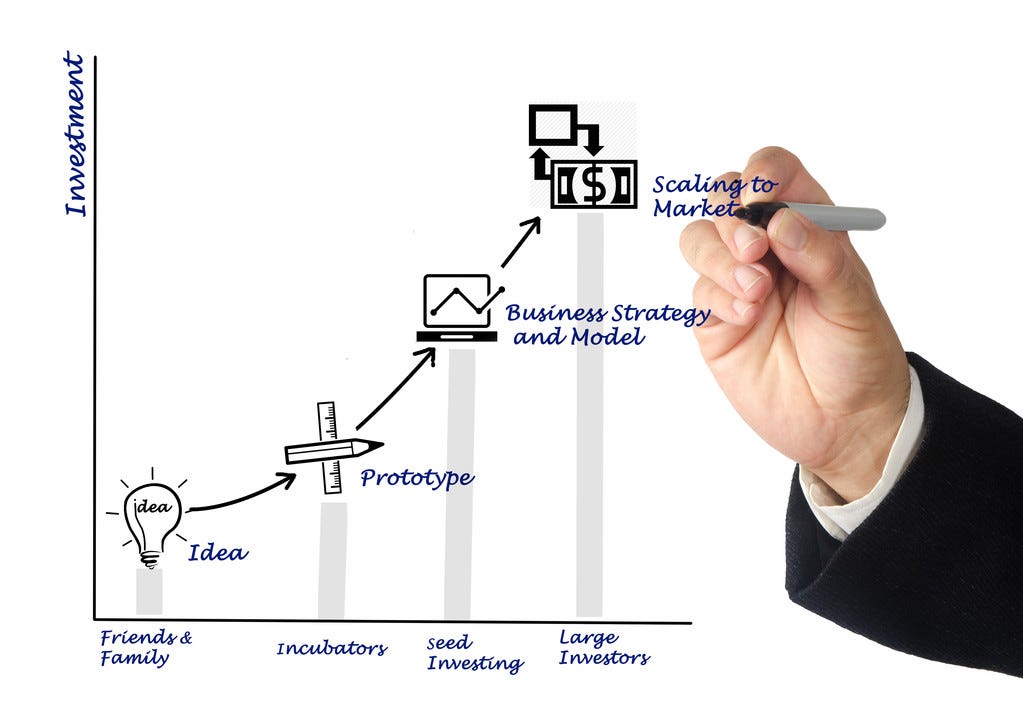A startup accelerator is a popular term, but what does it mean, exactly? In this post, you can find out what makes startup accelerators and incubators different and what startup accelerators promise.
The dot-com boom with the associated speculation bubble is a long history — but the hype about start-ups in the Internet business sector is unbroken. Many founders rely on a startup accelerator or an incubator to implement their ideas.
What is a startup incubator?
In English, the word “incubator” is initially a medical term for the incubator for premature babies. In business, the incubator is commonly understood as a business incubator funded by public or private money.
The leading target group of an incubator is founders and start-ups who are (usually) still in the early stages of implementing their ideas.
What is a startup accelerator — and what’s the difference
A startup accelerator is similar to an incubator in many details but is designed to be much more competitive. Directly translated, “accelerator” means accelerator, so it’s about giving a startup more speed. Think of it as a gas pedal that offers opportunities for intensive support for startups and companies in the startup phase to advance the business faster and more efficiently.
Typically funded with private capital, selected startups in the accelerator are made fit for the market as quickly as possible.
While a start-up can mature in a protected environment in the incubator, it must constantly prove itself in competitive situations in the startup accelerator. Studies indicate that both approaches multiply the chances of founding a company being successful.
What do accelerators do?
In practice, the incubator and startup accelerator proceed identically in their programs because the challenges that founders face are recurring.
For example, startups need office space, a coworking space, external knowledge, and/or help with financing. Business incubators and accelerators have these resources and make them available to startup founders.
The range of assistance offered ranges from creating a business plan and design, coaching, and startup financing to initiating contacts with large companies, which can result in corporate start-up partnerships.
In fact, the distinction between an incubator and an accelerator is fluid, but the general rule is: A startup accelerator selects its participants as part of a competition, often by pitching in a boot camp.
The winners will then benefit from a free program lasting several months, at the end of which investors can be convinced.
An accelerator means something like an accelerator or gas pedal and offers opportunities for intensive support for startups and companies in the start-up phase to advance the business faster and more efficiently.
The main difference is this: Incubators often help with the “hatching” of a business idea until it is ready for the market, while accelerator initiatives often lend a helping hand to companies that have just started.

What does an accelerator do?
The aim of the accelerator is to accelerate the development of young and newly founded startups. In addition, it should also be ensured that the company has a better chance of surviving in the market thanks to intensive support.
In most of the cases examined, this is also the case — companies funded in this way have a more than 80% chance of surviving on the market, far more than the average. However, since a selection is made from the applicant startups in advance, this number does not have to be fully meaningful.
Funding measures and goals of an accelerator
What the funding looks like in detail always depends on the respective accelerator initiative. In almost all cases, however, it is about intensive coaching and the comprehensive supply of entrepreneurial knowledge and professional experience. In addition, there is often the supply of office space, technical infrastructure, or, at the end of the funding phase, the company presentation to potential investors.
How long the “Boot Camp” phase lasts for the startup and which services are offered depends on the respective accelerator in each individual case.
An accelerator expects a return flow of funds via participation models.
Similar to business angels, the cost of intensive support is almost always covered by a stake in the company. The initiative can thus also benefit from the success of the coached and intensively supported company — this creates a win-win situation for both parties involved. However, the conditions and forms of participation can sometimes vary greatly.
How to apply for an accelerator program
There is a high demand for almost all accelerator and incubator initiatives. Only really promising startups, which are given a corresponding chance of success in advance, are accepted into the programs. Realistic market opportunities, possible high market potential, and a convincing start-up idea are particularly important for admission. In many cases, great importance is also attached to the professional and personal qualifications of the founder (or founders).
An incubator is more “cautious”. Startups can often rent a business incubator at their own expense and for longer periods of time. However, the aim is also to bring investors together with promising start-ups.
In return for investments and personal start-up support, accelerators and incubators often expect company shares from the startups, including profit sharing.
Internationally, the most essential accelerators are based in Silicon Valley. Y Combinator and TechStars are among the best-known and largest.
Incubators, on the other hand, often dock at university locations. Google and Microsoft also advertise various startup programs and think more globally.
If you are looking for a startup accelerator that suits your project, it may be worth considering regional and industry-specific offers.
Startup accelerators: Examples and success stories
Unicorns are companies that have a market valuation of more than one billion US dollars even before they go public.
Airbnb was early promoted by the Accelerator Y Combinator, as was Dropbox. In Germany, early on, Zalando came across the Samwer brothers behind Rocket Internet.
If you go through the company histories of German and international unicorns, you will notice that around half have completed the program at a startup accelerator, although the boundaries to the incubator are fluid.
It is striking that startups with such a history often set up an accelerator program, which proves positive experiences.
Founders report again and again that the benefits of a startup accelerator for them go far beyond financing issues.
Test users from other projects, short and direct access to expert knowledge, and last but not least, the realistic time pressure are mentioned as other important factors.
It is also expected that many startups have visited more than just one accelerator or incubator in their first few years.
In your search for a suitable startup accelerator, you will read about success stories on their online presence and thus be able to get a more precise picture of where priorities are set.
Conclusion: Accelerators offer more than just venture capital
In the start-up scene, startup accelerators mostly enjoy a good reputation. The way into such programs can be exhausting, like participation.
But the immediate benefit of preparing yourself for the challenging business world outweighs much. You should not only think of investors but also really use synergy effects and expert knowledge.
The fairy tale of the brilliant founder who tackles a large project alone or with friends is rarely written. In reality, startups do better than self-critically recognizing the areas where they need support.
Whether they ideally experience this in a startup accelerator, an incubator, a start-up center or a related hybrid depends mainly on the individual project.
Considering applications and participation at an early stage of your project is a good idea. You will save much time with a startup accelerator and avoid dead ends. All in all, possibly giving up parts of the company for this is a fair deal.

